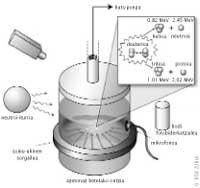Cold fusion?
If the fusion could affect a controllable temperature, the problem of conventional nuclear power plants could be solved. But so far this research has not yielded results and lately there have been many debates to decide whether to spend money on it.

Now the journal Science has released a cold fusion experiment. American physicist Rusi Taleyarkhan introduced acetone with hydrogen atoms into a cylindrical vessel and bombarded it by sound waves. At the same time, he bombarded mostly a range of high-speed neutrons. In this way bubbles of a millimeter of diameter were formed that interacted with deuterium atoms, supposedly fused. This new technique is called acoustic cavitation.
American physicists Dan Shapira and Michael Saltmarsh tried to repeat Taleyarkhan's experiment with this detector and did not detect neutrons, the fusion indicator. But other scientists have also criticized this last experiment.
In this week's journal Science decided to communicate the cold fusion, a decision justified in the editorial. Editor Donald Kennedy explains the controversy raised. Accepting this debate, the editors have defended the need to report this type of research and that in these cases the criteria should not be very strict. Science has approved the article, but there is intense debate.





